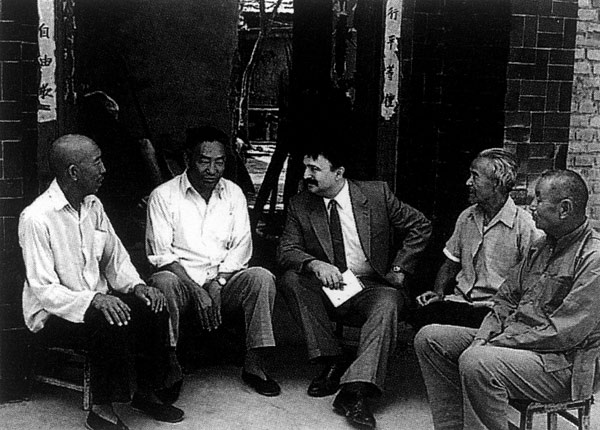 |
|
Guy Alitto, professor of history at the University of Chicago, talks with villagers in Zouping in the late 1980s. [Photo/China Daily] |
Qu Yanqing, a historian with the Zouping County Archives Office, helped Alitto to settle into local life. He witnessed the US academic change from a man with "a jarring existence" to someone who "could walk freely through almost every door in any village".
"One night, not long after we met, I invited him to my house for dinner. The next morning, an old lady who lived next door shouted to my wife over the low rammed-earth wall, 'How bold was your husband to bring that scary man home?'," Qu recalled, with laughter. "I wondered what she would have said if she'd known that the 'scary man' had gulped down more than 20 cans of beer."
Qu and Alitto have drunk together many times; sometimes with frustration-such as the time Alitto was despondent after being refused full access to the county archives-and sometimes with joy, such as Qu's 60th birthday party in 2007, 16 years after the project ended.
"He's a sincere man and a loyal friend, with a dedication to truth that I so admire as a fellow historian," Qu said, adding that he didn't need to "chaparone" Alitto when he returned to Zouping in 1988.
"Although it was a decade after the 'cultural revolution', people still tended to keep their lips zipped, especially in front of foreigners. But Alitto had a knack of putting people at ease," he said.
A casual approach
Alitto's favorite method involved casual chats with interviewees, many in their 60s and 70s, as they sat on wooden stools in a sun-drenched front yard. "Initially, I asked each of them a list of questions, as I would have done in the US, and they all balked," he said. "Then I sat down and started talking about my own childhood, the things that I ate and the games that I played. Gradually they unwound."
Alitto's communication skills allowed him to broach sensitive topics. "I wanted to know more about the Great Famine between 1959 and 1961. But given the sensitivity of the issue, few people spoke freely about it," he said. "So I mentioned not the Great Famine, but a locust plague that had ravaged Zouping in the 1920s.
"I remember asking a man in his 80s, 'You must have seen deaths during the locust plague, right?' And his immediate reaction was: "No, no, no, not many died at that time. But a lot of people died during the Great Famine.'"
Alitto often found himself in the role of a confidant: "Some people told me that their fathers beat their mothers, or that their fathers were opium smokers or gamblers-things that hurt, yet had never been mentioned before."
Nowadays, the two buildings the researchers occupied in Fengjiacun stand as a reminder of their time in Zouping and also of the heyday of the village. Built in 1987, the 16-room, two-story houses were used by all the academics who visited during the five-year project. The exteriors still carry the original yellow paint and boast yellow and green rooftiles, but inside, the rooms are dilapidated, with cracked ceilings, peeling walls and ill-fitting windows that allow the winter wind to whistle through.
However, many features indicate the efforts the local government made to make the foreign guests comfortable. "After the buildings were completed, I traveled to Zibo, Shandong's fourth-biggest city, about 20 kilometers away, to buy flush toilets and porcelain bathtubs. Back then, those things were absolute novelties in Zouping," Feng said.
In the 1980s and '90s, Feng Yongxi, a distant relation of Feng Yuezhao, was the Party chief of Fengjiacun. Alitto remembers him as "gruff upon initial contact, but (he) turned out to be a very sweet person; generous, understanding and accommodating". In 1987, Alitto invited Feng Yongxi to dinner at his house when the official was a member of the first delegation from Zouping to visit Chicago.
Feng Yongxi's old home stands a few minutes' walk from the researchers' residences. Although his bedroom has been empty since he died in 2013, at age 81, black-and-white photos still hang on the wall, showing him with his friends from the US.